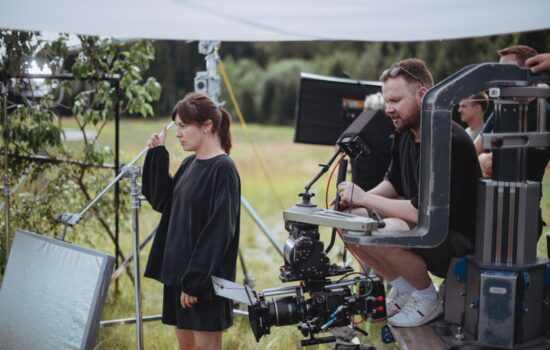Script Reader
Career Overview
Script Readers provide script coverage for scripts being considered for production, agency representation, or film contest awards.
Alternate Titles
Script Consultant, Script Coverage Services, Script Analyst
Salary Range
$1,544 to $1,857 a week1

How To Become a Script Reader
People also ask
Career Description
A Script Reader may read scripts for a variety of purposes, such as on behalf of a Producer or studio looking for scripts to go into production, or on behalf of a contest that is looking to award a prize, or on behalf of an agency or management company seeking Writers for representation.
Script Readers are expected to provide extensive script coverage that can include a script summary, a breakdown of character, structure, and overall marketability of the project.
Vanessa Pegram has worked providing coverage both on behalf of a boutique management company and the BlueCat Screenplay Contest. She recently launched her own company to provide coverage directly to Writers. She breaks down her typical day doing coverage:
“I provide notes on other people’s scripts, and that’s any genre or format, feature or TV. I sit down with a script, and I like to do it all digitally to save paper. I read the script, and as I am going along, I make notes in Adobe Acrobat Reader, and I look for issues with story, character, theme, plot, even some things so small as grammar, or script format.
“Incorrect script format can stand out right away. I make notes along the way, and then I take a few minutes to gather my thoughts about the overall macro notes of the script. What are the big issues that need to be addressed to make it a cohesive successful piece?”
Pegram gives the excellent tip of always starting with positive feedback: “I always start with what is done well. Then I go in and address the bigger issues of ‘this could be tweaked here.’ Instead of saying ‘this isn’t working,’ I try to also always offer a solution. I can get two or three done in a day. I try to give myself typical business hours to sit down and give notes.”
What does a Script Reader do?
A Script Reader is an individual who professionally evaluates the different components of a screenplay, including the plot, characterizations, themes, tone, marketability, and overall impact, to determine if an independent Producer, production company, or studio should consider producing it.
Salary
The weekly salary range for Script Readers runs from $1,544 to $1,857 a week, according to the Motion Picture Editors Guild.
“For me, since I have my own business, I create my own prices,” Pegram tells us. “I am trying to be competitive with other services out there. At the end of the day, I can’t create a prize like a contest would, that’s not my intention. I am competitive within a certain range. I break it down into how long it takes me to read. I gave myself an hourly rate for each type of script and then priced accordingly.
“People who have been doing coverage for a really long time do have more inflated rates, and that makes sense. On the flip side, there are people just starting off and their rates are really low. Within the competition circuit, I would say the rates are definitely lower for a Reader, probably to the point that you could not make a steady living just reading for one competition.
“Even if you were a reading machine, it’s more of a way to supplement your income but it’s also great for experience, and I have learned so much reading for BlueCat. You also see trends and patterns in people’s writing. Everyone will be focused on a similar subject or style. You wouldn’t be able to live off that solely, even if you were doing it seven days a week.”
How much money does a Script Reader make?
A minority of Script Readers are employed fulltime at a production company or studio. Of those who do, they may earn upwards of $100,000 with enough experience and veteran status. Often though, Script Readers work in a freelance capacity for a production company or other organization such as a film festival or screenwriting competition. Because they are not generally working fulltime for an entire year, their overall income may be closer to a few thousand dollars a year.
Hey, what do you think about trying our new Film Career HelperFilm Career Helper really quick? It’s totally free and could help get your career moving fast! Give it a try. It’s totally free and you have nothing to lose.
Career Outlook
“Maintaining a work/life balance is tricky,” Pegram says. “I am my own boss, so I create my own schedule. It is easier to manage when I am not that busy. If I don’t have a lot of coverage to do, I will spend my time to better myself by watching TV or films. I break down what I watch.
“What are these Writers doing that has kept my attention for an hour and a half? I try to get up at the same time of the day every day and start my day. I know what I have to get through every day. I give myself daily goals to hit.
“I try to work with a 9 to 5 kind of schedule with an hour lunch break where I make myself stop reading and take a break before I get back to it. I try really hard to end my day at a manageable hour. You have to make time to have a life as well. It doesn’t always work, but I try.”
Career Path
Pegram says the career of a Reader is about as atypical as it gets, but having incredible writing skills will help the most: “I’ve always loved telling stories. That’s how I got into it. I was a fiction writing major at Columbia College for undergrad, and then decided I really wanted to write for TV, and that brought me to the American Film Institute in Los Angeles.
“That’s where I would say I really learned how to tell a story. You have to know firsthand how to tell a successful story before you can give great feedback.”
Experience in the real world will also help along the way to becoming a Reader: “While I was at AFI, I did an internship for this boutique talent agency and that’s where I really learned how to do script coverage. As a grad student, you are always giving notes to your peers on their scripts and learning from other people’s notes, too.
“That helped me get that internship. The internship is really where I cut my teeth on reading scripts that are of a higher caliber than student scripts. I read a lot of scripts that were close to production. I needed to give notes on if this [script] was going to be a successful movie or not.”
Pegram then also got a paying gig giving feedback for BlueCat Screenplay Contest: “That is a different type of coverage. That’s less reading for a specific production. That’s more analyzing. I had a lot of Readers request me specifically. I had a lot of people request me again. A lot of people requested me outside of the competition.
“That’s when I decided to start my own business, which is Scriptrx Consultancy. I give a lot of notes on people preparing scripts for competition, or preparing to send to an Agent or Manager, or Script Analyst.”
Pegram says an internship is a great place to start for aspiring Script Readers. “No one wants to work for free, and I am not saying go work for free for a prolonged period, but an internship is a really great entry-level position — not only to do script coverage but to find other jobs as well.
“When I interned I had to cover the desk, and I was on the phone calls to take notes, and I learned more of the business side of things this way. My cubicle was right outside the owner’s office and I would listen to phone calls, and it was so helpful to learn. Make sure it is a short term internship if it’s not paid. You don’t need to do it for years.”
“This is definitely a niche type of job, but every now and again these positions are posted on ZipRecruiter or Glassdoor,” Pegram says.
She also suggests aspiring Readers:
- Look for an internship.
- Join a Writers’ group.
- Be a Writer and practice your craft.
- Learn the ins and outs of storytelling.
- Try to give notes to a peer.
Experience & Skills
Pegram believes her Writer’s workshop really helped her build essential skills for a Script Reader. She says, “It felt like a safe space. When you are in a classroom setting you might feel like your Teacher is analyzing your analysis, or you might not feel comfortable or confident or you might not feel confident in giving notes.
“Getting comfortable and confident [is important]. So again, being in a Writer’s group is incredibly helpful. Surround yourself with people who are better than you. It gets you to elevate your own level.”
“Patience is key,” she says. “You have to be able to not become enraged when you are reading a script that needs a little more help. Keep in mind people are coming to you for help. Their scripts might not be finished, or polished. At the same time, you need to be tough. There is no point in being really really nice.
“You can be constructive, but I do try to give notes that are tough, but fair. I am going to give you this note in a nice way, but I am definitely going to give you this note. You have to be ok with working alone most of the day. It can be a really isolating job.
“I sit in my office with my laptop, and I read all day. I don’t have coworkers or a boss. That’s a positive flip side. You have to be driven enough to keep a schedule. You have to be able to show up, and do the work on your own.”
What do you call a Script Reader?
A Script Reader may also be referred to as a Script Analyst or Story Analyst. Often these titles are used interchangeably.
Education & Training
Pegram continues to stress you really have to know how to write in advance of doing coverage. “I think you have to know how to craft a story. That is super important. You have to be able to create a story in order to analyze one. It really helps if you are a Writer in order to give coverage on scripts. You are very familiar with the ins and outs, and how to craft a script.
“It’s more than just, ‘Hey, I have a good idea.’ This might make a fun or entertaining movie. That doesn’t mean you have a plot, or character, or structure. At the American Film Institute, I really learned structure and The Hero’s Journey, and how to make a story about characters people want to go on this journey with.”
Pegram also recommends taking the time to read structure books: “Save the Cat is a great one. So is Robert Mckee’s Story. But also reading other people’s scripts and trying to analyze their work is a huge learning experience. A Writer’s workshop is priceless. Getting your peers’ feedback on your script and seeing what notes they may have, as well: it’s incredibly helpful.”
Additional Resources
“The LA TV Writer’s Facebook Group is very helpful. That has been helpful for me in promoting my site. John August’s website is great, as is his podcast Script Notes. The Write On podcast from Final Draft is also great. Those are helpful in learning about story.
“Any time you can listen to a Writer talk about their craft I think is helpful, especially if it’s a show you really like. You can read scripts at the WGA library if you live in Los Angeles. There’s also Simply Scripts to read scripts for free.”
FAQ
What is the single biggest suggestion you would give to someone wanting to get into this career?
“Make sure you can read a lot. You have to enjoy reading, and that you can read a lot of things that are not perfect. There’s a big difference in reading a published book and reading a first draft of that book. Learn how to be fair with your notes.”
What’s the #1 mistake people make when trying to get into this career?
“I think it kind of goes hand-in-hand with the first question you asked. People think it’s super easy to give notes, and they don’t have the patience to do it. Also if it’s going into business for yourself, you might be setting your rates too low. Make sure you are paying yourself a minimum wage.”
What is the question people should ask about this career but rarely do?
“The amount of time that it actually does take. If you think about reading a feature script, it takes you an hour and a half to watch it. It takes you at least that long to read it, depending on the quality, and then you have to formulate constructive notes. Some people think they can do 10 scripts in a day, and that’s really difficult to do. I don’t recommend trying.”
If you could describe in one word what makes you successful, what would it be?
“Patience.”
Sources

Vanessa Pegram
Vanessa Pegram is the founder and owner of Script Rx Consultancy and has her MFA in Screenwriting from The American Film Institute Conservatory in Los Angeles, California.
After years of reading hundreds of scripts for her peers, Vanessa was hired by a boutique talent agency in Hollywood, where she provided coverage for projects for Nicole Kidman, Angelina Jolie, and Kate Beckinsale.
Vanessa was also hired by the BlueCat Screenwriting competition to judge and provide coverage for scripts in all genres and lengths. She currently lives and writes in Los Angeles and also has her BA in Fiction Writing from Columbia College Chicago.
References
- 1. "Editors Guild". Editors Guild. published: . retrieved on: April 9, 2020



















